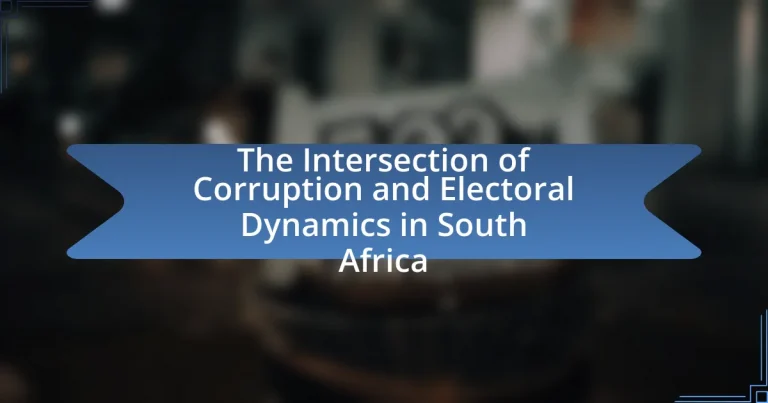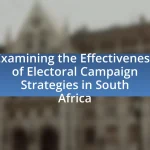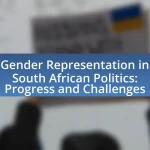The article examines the intersection of corruption and electoral dynamics in South Africa, highlighting how corrupt practices undermine the integrity of elections and public trust in governance. It discusses various manifestations of corruption, including vote buying and manipulation of voter registration, and their impact on voter behavior and political competition. The historical context of corruption, particularly its roots in apartheid, is analyzed alongside recent scandals that have shaped public perception of political parties. Additionally, the article addresses current challenges in combating electoral corruption and outlines measures being taken to enhance electoral integrity, emphasizing the role of civil society and technology in promoting transparency and accountability.
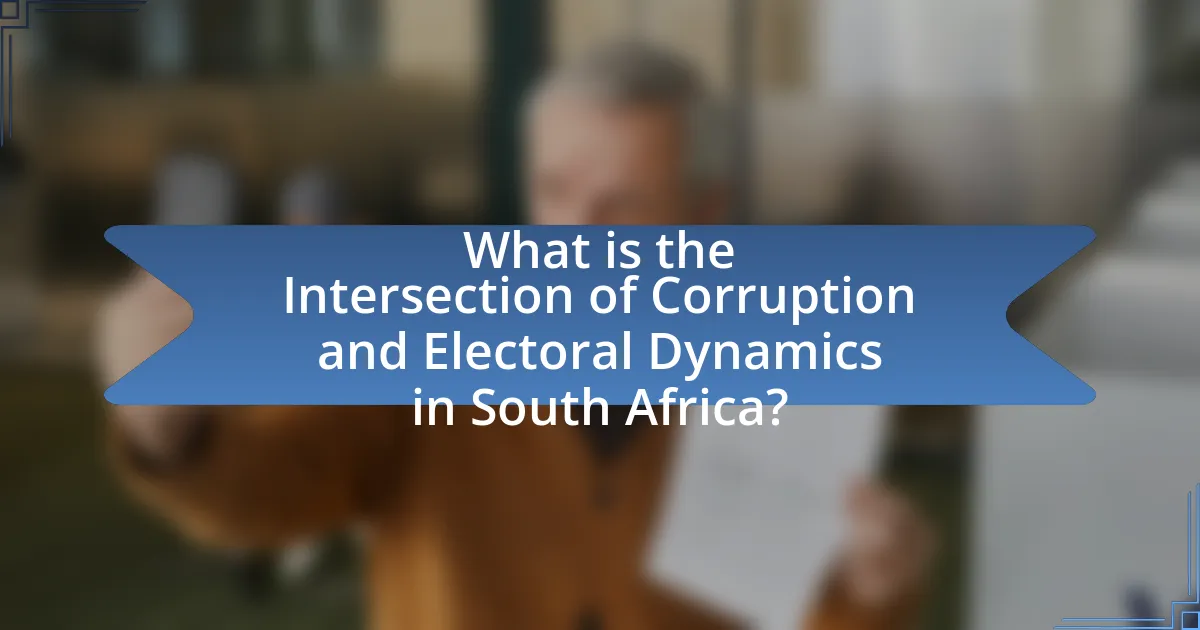
What is the Intersection of Corruption and Electoral Dynamics in South Africa?
The intersection of corruption and electoral dynamics in South Africa is characterized by the influence of corrupt practices on the integrity and outcomes of elections. Corruption undermines public trust in electoral processes, leading to voter apathy and manipulation of electoral outcomes, as evidenced by the 2016 local elections where allegations of vote-buying and intimidation were reported. Furthermore, the South African Electoral Commission has noted that corruption can distort political competition, favoring incumbents and limiting the effectiveness of opposition parties. This dynamic creates a cycle where corruption perpetuates itself, as political actors may engage in corrupt activities to secure electoral victories, thereby compromising democratic governance.
How does corruption manifest in South African electoral processes?
Corruption in South African electoral processes manifests primarily through vote buying, manipulation of voter registration, and the influence of money in politics. Vote buying occurs when candidates or parties offer financial incentives or goods to voters in exchange for their votes, undermining the integrity of the electoral process. Manipulation of voter registration involves fraudulent practices, such as registering ineligible individuals or failing to remove deceased voters from the rolls, which skews electoral outcomes. Additionally, the influence of money in politics is evident in the funding of campaigns, where wealthy donors can disproportionately sway political agendas and candidate selection, as highlighted by the 2021 report from the Electoral Commission of South Africa, which noted that financial irregularities and lack of transparency in campaign financing are significant concerns.
What are the common forms of electoral corruption in South Africa?
Common forms of electoral corruption in South Africa include vote buying, manipulation of voter registration, and abuse of state resources. Vote buying occurs when candidates or parties offer money or goods to voters in exchange for their votes, undermining the integrity of the electoral process. Manipulation of voter registration involves fraudulent practices such as registering ineligible voters or removing eligible voters from the rolls, which distorts the electoral outcome. Abuse of state resources refers to the use of government funds or assets for campaign purposes, giving certain candidates an unfair advantage. These practices have been documented in various reports, including those from the Electoral Commission of South Africa, which highlights the ongoing challenges in ensuring free and fair elections.
How does corruption influence voter behavior and public trust?
Corruption significantly undermines voter behavior and public trust by fostering cynicism and disengagement among the electorate. When citizens perceive corruption within political systems, they often feel disillusioned, leading to decreased voter turnout and apathy towards electoral processes. For instance, a study by the Electoral Institute for Sustainable Democracy in Africa found that high levels of perceived corruption correlate with lower voter participation rates in South Africa, indicating that voters may believe their participation will not lead to meaningful change. Additionally, public trust in government institutions diminishes as corruption scandals emerge, further alienating citizens from political engagement. This erosion of trust can create a vicious cycle where voters become increasingly skeptical of all political actors, regardless of their integrity, ultimately destabilizing democratic processes.
Why is understanding this intersection important for South Africa’s democracy?
Understanding the intersection of corruption and electoral dynamics is crucial for South Africa’s democracy because it directly impacts the integrity of electoral processes and public trust in governance. Corruption undermines fair competition among political parties, leading to distorted electoral outcomes and disenfranchisement of voters. For instance, the 2016 local elections revealed that allegations of corruption influenced voter turnout and perceptions of legitimacy, as reported by the Electoral Commission of South Africa. This relationship highlights the need for transparency and accountability to ensure that democratic principles are upheld, fostering a political environment where citizens can engage meaningfully in the electoral process.
What are the implications of corruption on electoral integrity?
Corruption significantly undermines electoral integrity by eroding public trust in the electoral process and facilitating unfair advantages for certain candidates or parties. When corruption occurs, such as vote-buying or manipulation of electoral laws, it distorts the democratic principle of free and fair elections. For instance, a study by the Electoral Institute for Sustainable Democracy in Africa found that perceived corruption in South Africa’s elections leads to decreased voter turnout, as citizens lose faith in the effectiveness of their participation. This decline in trust can result in a vicious cycle where corruption becomes entrenched, further diminishing the legitimacy of electoral outcomes and weakening democratic institutions.
How does electoral dynamics shape the political landscape in South Africa?
Electoral dynamics significantly shape the political landscape in South Africa by influencing party competition, voter behavior, and governance outcomes. The country’s electoral system, characterized by proportional representation, allows for a diverse range of political parties to participate, which fosters a multiparty system. This system has led to the dominance of the African National Congress (ANC) since the end of apartheid, but recent electoral trends indicate a fragmentation of voter support, with parties like the Economic Freedom Fighters (EFF) and the Democratic Alliance (DA) gaining traction.
The dynamics of voter turnout and engagement also play a crucial role; for instance, the 2019 national elections saw a decline in voter turnout to 65%, reflecting growing disillusionment with political parties and governance. This discontent can be linked to perceptions of corruption, which have been highlighted in various reports, including the Zondo Commission’s findings on state capture. Such corruption scandals impact electoral dynamics by eroding public trust and prompting shifts in voter allegiance, thereby reshaping the political landscape.
In summary, electoral dynamics in South Africa are shaped by the interplay of party competition, voter behavior, and the influence of corruption, which collectively determine the effectiveness and stability of governance in the country.
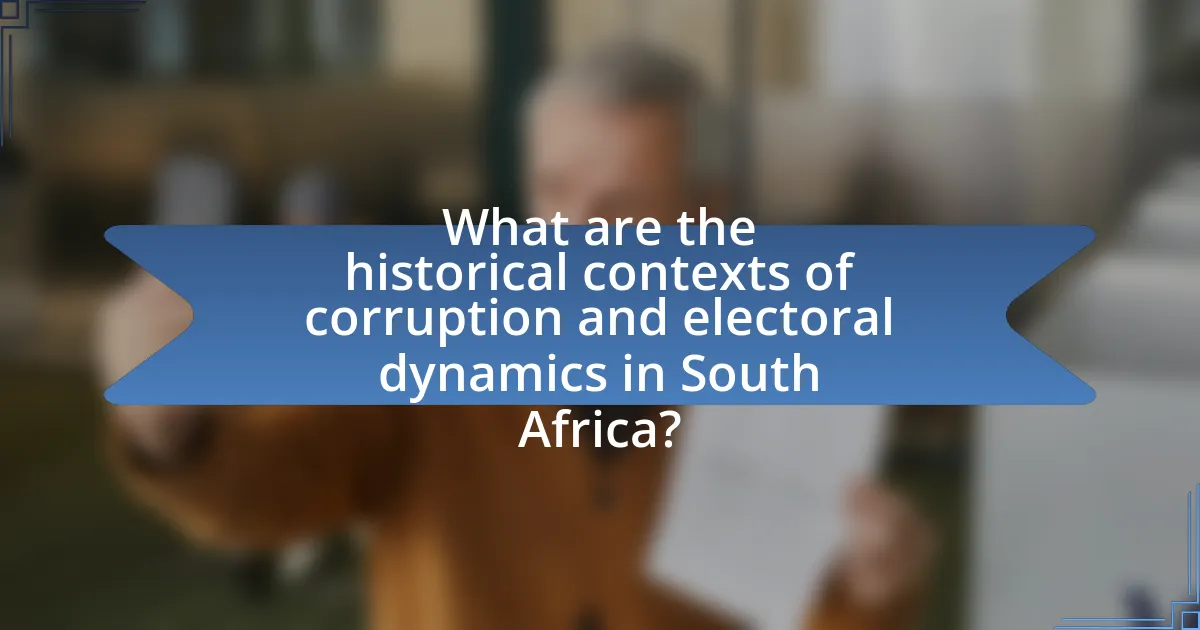
What are the historical contexts of corruption and electoral dynamics in South Africa?
The historical contexts of corruption and electoral dynamics in South Africa are deeply intertwined with the legacy of apartheid and the subsequent transition to democracy in 1994. The apartheid regime, characterized by systemic inequality and state-sanctioned corruption, laid a foundation for corrupt practices that persisted post-apartheid. Following the end of apartheid, the African National Congress (ANC) emerged as the dominant political party, but allegations of corruption within its ranks, particularly during the presidency of Jacob Zuma from 2009 to 2018, highlighted significant electoral dynamics where patronage and clientelism influenced voter behavior and party loyalty. The Public Protector’s reports and the Zondo Commission’s findings revealed extensive state capture, where private interests infiltrated state institutions, undermining democratic processes. These historical contexts illustrate how corruption has shaped electoral dynamics, affecting public trust and participation in the democratic process.
How has the legacy of apartheid influenced current electoral practices?
The legacy of apartheid has significantly influenced current electoral practices in South Africa by perpetuating systemic inequalities and shaping voter behavior. The historical disenfranchisement of non-white populations has resulted in ongoing disparities in political representation and access to resources. For instance, the African National Congress (ANC), which emerged as a dominant political force post-apartheid, continues to face challenges related to corruption and governance, impacting public trust in electoral processes. According to the Electoral Commission of South Africa, voter turnout among marginalized communities remains lower than among historically privileged groups, reflecting the enduring effects of apartheid-era policies on civic engagement and participation.
What role did historical corruption play in shaping modern electoral systems?
Historical corruption significantly influenced the development of modern electoral systems by highlighting the need for reforms aimed at increasing transparency and accountability. In South Africa, for instance, the legacy of apartheid-era corruption led to the establishment of mechanisms such as the Electoral Commission of South Africa in 1997, which was designed to ensure free and fair elections. This response to past corruption included implementing strict regulations on campaign financing and voter registration processes, thereby shaping a more robust electoral framework. The historical context of corruption has thus been pivotal in driving legislative changes that seek to mitigate the risks of electoral fraud and enhance public trust in democratic processes.
How have past electoral reforms addressed corruption issues?
Past electoral reforms in South Africa have aimed to address corruption issues primarily through the implementation of stricter regulations and oversight mechanisms. For instance, the introduction of the Electoral Act of 1998 established a framework for the management of elections, which included provisions for the transparency of campaign financing and the accountability of political parties. Additionally, the establishment of the Electoral Commission of South Africa (IEC) has played a crucial role in monitoring electoral processes and ensuring compliance with electoral laws. These reforms have been supported by various studies, including the 2019 report by the Public Protector, which highlighted the need for enhanced transparency in political funding to combat corruption effectively.
What key events have highlighted the intersection of corruption and electoral dynamics?
Key events that have highlighted the intersection of corruption and electoral dynamics in South Africa include the 2016 local government elections, where allegations of vote-buying and manipulation emerged, particularly in the context of the African National Congress’s (ANC) declining support. Additionally, the 2018 resignation of President Jacob Zuma, amid numerous corruption scandals, significantly impacted electoral dynamics by shifting public trust and influencing voter behavior in subsequent elections. The 2019 national elections further illustrated this intersection, as the Economic Freedom Fighters (EFF) capitalized on anti-corruption sentiments, gaining traction among disillusioned voters. These events collectively demonstrate how corruption allegations can shape electoral outcomes and party strategies in South Africa.
What were the major scandals that impacted elections in South Africa?
Major scandals that impacted elections in South Africa include the Arms Deal scandal, the Nkandla scandal, and the State Capture allegations. The Arms Deal scandal, which emerged in the late 1990s, involved allegations of corruption related to a multi-billion rand arms procurement deal, leading to significant public distrust in the government. The Nkandla scandal revolved around the misuse of state funds for upgrades to former President Jacob Zuma’s private residence, which sparked widespread outrage and calls for accountability. Additionally, the State Capture allegations, particularly those involving the Gupta family and their influence over state institutions, have raised serious concerns about the integrity of the electoral process and governance in South Africa. These scandals collectively highlight the pervasive issues of corruption that have influenced public perception and electoral outcomes in the country.
How did these events affect public perception of political parties?
The events surrounding corruption scandals in South Africa significantly diminished public trust in political parties. For instance, the exposure of high-profile corruption cases, such as those involving the African National Congress (ANC) and former President Jacob Zuma, led to widespread disillusionment among voters. According to a 2019 survey by the Institute for Justice and Reconciliation, 62% of South Africans expressed a lack of trust in political parties, reflecting a direct consequence of these scandals. This erosion of trust has resulted in increased support for alternative parties, as citizens seek accountability and transparency in governance.
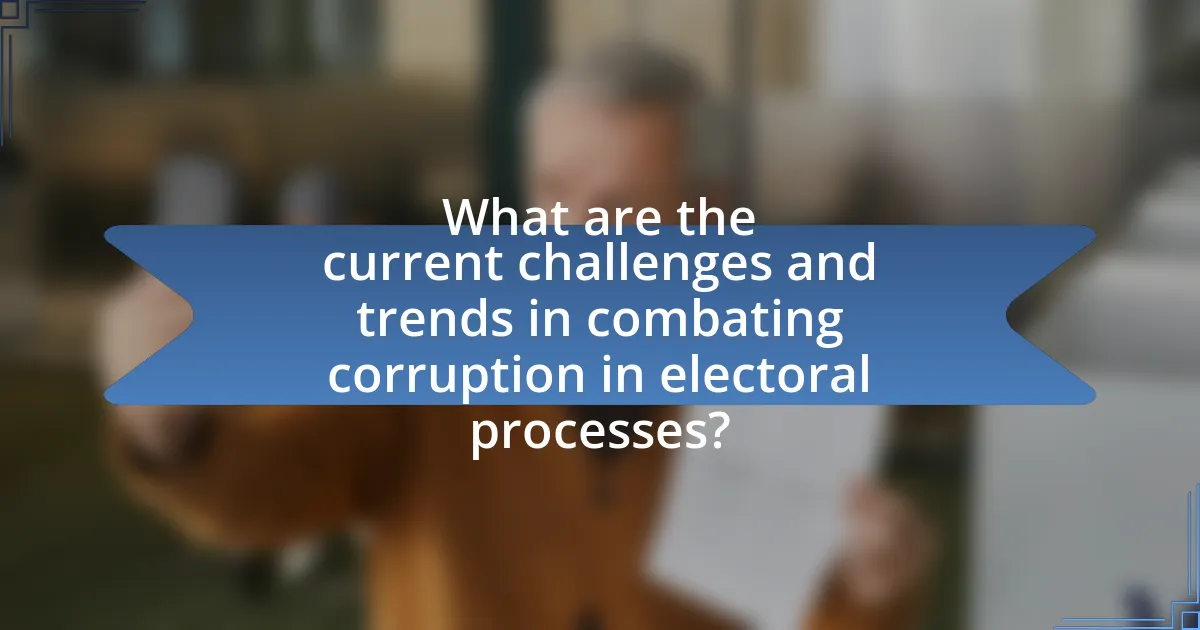
What are the current challenges and trends in combating corruption in electoral processes?
Current challenges in combating corruption in electoral processes include inadequate regulatory frameworks, lack of transparency, and insufficient enforcement of anti-corruption laws. In South Africa, for instance, the Electoral Commission has faced criticism for its limited capacity to monitor campaign financing effectively, which has led to allegations of illicit funding influencing electoral outcomes. Trends in addressing these challenges involve increasing the use of technology for transparency, such as electronic voting systems and blockchain for tracking campaign donations. Additionally, civil society organizations are playing a more active role in monitoring elections and advocating for reforms, as seen in initiatives like the Electoral Integrity Project, which aims to enhance accountability and public trust in the electoral process.
What measures are being taken to address electoral corruption in South Africa?
The South African government is implementing several measures to address electoral corruption, including the establishment of the Electoral Commission of South Africa (IEC), which oversees free and fair elections. The IEC has enhanced its regulatory framework by introducing stricter campaign finance laws to limit the influence of money in politics. Additionally, the Prevention and Combating of Corrupt Activities Act provides legal mechanisms to prosecute electoral fraud. Recent initiatives also include public awareness campaigns aimed at educating citizens about their voting rights and the importance of reporting corruption. These measures are supported by various civil society organizations that monitor electoral processes and advocate for transparency.
How effective are current anti-corruption strategies in elections?
Current anti-corruption strategies in elections are moderately effective, as evidenced by their ability to reduce overt electoral fraud but facing challenges in addressing systemic corruption. For instance, South Africa has implemented measures such as the Electoral Commission’s oversight and the Public Protector’s investigations, which have led to increased accountability and transparency in some electoral processes. However, despite these strategies, issues like vote-buying and manipulation persist, indicating that while progress has been made, significant gaps remain in fully eradicating corruption from the electoral landscape.
What role do civil society and media play in combating electoral corruption?
Civil society and media play a crucial role in combating electoral corruption by promoting transparency and accountability in the electoral process. Civil society organizations often engage in monitoring elections, advocating for electoral reforms, and mobilizing public awareness campaigns to expose corrupt practices. For instance, organizations like the Electoral Institute for Sustainable Democracy in Africa (EISA) have been instrumental in providing independent election observation in South Africa, which helps to ensure fair electoral practices.
Similarly, media outlets serve as watchdogs by investigating and reporting on electoral misconduct, thereby informing the public and holding officials accountable. Investigative journalism has uncovered numerous instances of corruption, such as the 2016 local government elections where media reports highlighted irregularities and vote-buying incidents. This reporting not only raises awareness but also pressures authorities to take action against corrupt practices, reinforcing the integrity of the electoral process.
How do electoral dynamics evolve in response to corruption scandals?
Electoral dynamics evolve significantly in response to corruption scandals, often leading to shifts in voter behavior and party strategies. When corruption scandals emerge, public trust in political institutions typically declines, prompting voters to seek alternatives to the incumbent parties associated with the scandals. For instance, in South Africa, the 2017 state capture allegations against the ruling African National Congress resulted in a notable decline in their electoral support, as evidenced by the 2019 national elections where the ANC’s share of the vote dropped to 57.5%, down from 62.1% in 2014. This decline illustrates how corruption can catalyze the rise of opposition parties, as voters become more inclined to support parties that promise transparency and accountability. Additionally, political parties may adjust their campaign strategies to distance themselves from corruption, emphasizing reform and integrity to regain public confidence.
What changes in voter turnout and party support have been observed?
Voter turnout in South Africa has shown a declining trend, with the 2019 national elections witnessing a turnout of 66.5%, down from 73.4% in 1994. This decrease indicates growing voter apathy and disillusionment with the electoral process. Concurrently, party support has shifted significantly; the African National Congress (ANC) experienced a drop in support, receiving only 57.5% of the vote in 2019, compared to 62.2% in 2014. This decline reflects increasing dissatisfaction with the ANC amid corruption scandals. In contrast, the Economic Freedom Fighters (EFF) and the Democratic Alliance (DA) have gained traction, with the EFF securing 10.8% and the DA 21.1% of the vote in 2019, indicating a fragmentation of party support and a potential realignment in South African politics.
How do political parties adapt their strategies in light of corruption issues?
Political parties adapt their strategies in light of corruption issues by implementing transparency measures, enhancing accountability, and shifting their messaging to emphasize integrity. For instance, parties may adopt stricter internal governance policies to prevent corruption, such as establishing independent oversight committees. Additionally, they often engage in public campaigns that highlight their commitment to anti-corruption, aiming to rebuild trust among voters. Evidence of this can be seen in the African National Congress (ANC) in South Africa, which has faced significant corruption allegations and responded by promoting initiatives like the establishment of the Zondo Commission to investigate state capture, thereby attempting to restore public confidence and electoral support.
What practical steps can be taken to enhance electoral integrity in South Africa?
To enhance electoral integrity in South Africa, implementing a robust system of independent electoral oversight is essential. Establishing an independent electoral commission with the authority to monitor elections, investigate irregularities, and enforce compliance with electoral laws can significantly reduce corruption. For instance, the Electoral Commission of South Africa (IEC) has previously been tasked with ensuring free and fair elections, but strengthening its independence and resources can improve its effectiveness. Additionally, adopting advanced technology for voter registration and ballot casting, such as biometric systems, can help eliminate fraud and ensure accurate voter identification. Countries like India have successfully utilized biometric systems to enhance electoral integrity, demonstrating their effectiveness in reducing electoral malpractices. Furthermore, increasing transparency through public access to electoral data and results can foster trust in the electoral process, as seen in various democracies worldwide. These steps, supported by international best practices, can significantly enhance the integrity of elections in South Africa.
What best practices can be implemented to reduce corruption in elections?
Implementing transparent electoral processes is a best practice that can significantly reduce corruption in elections. This includes measures such as independent electoral commissions that oversee the election process, ensuring that all activities are conducted fairly and openly. For instance, countries like Canada have successfully utilized independent bodies to manage elections, which has led to increased public trust and lower instances of electoral fraud. Additionally, adopting technology such as electronic voting systems can enhance transparency and reduce opportunities for manipulation, as seen in countries like Estonia, where digital voting has streamlined the electoral process and minimized corruption risks. Furthermore, promoting civic education and encouraging public participation in the electoral process empowers citizens to hold officials accountable, thereby deterring corrupt practices.
How can citizens engage in promoting electoral transparency and accountability?
Citizens can engage in promoting electoral transparency and accountability by actively participating in monitoring electoral processes and advocating for reforms. For instance, organizations like the Electoral Institute for Sustainable Democracy in Africa (EISA) provide platforms for citizens to observe elections, ensuring that procedures are followed and reported accurately. Additionally, citizens can utilize social media to raise awareness about electoral issues, share information on candidates, and mobilize community efforts for accountability. Research indicates that public participation in electoral oversight can lead to increased trust in electoral outcomes, as seen in South Africa’s 2019 elections where citizen engagement helped highlight irregularities.
